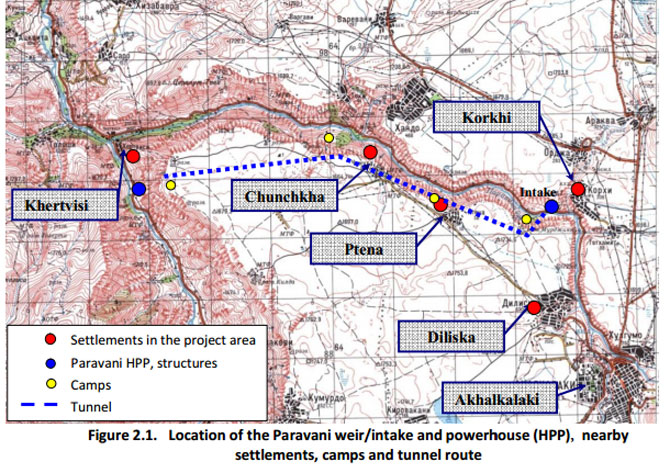
Anadolu Group Launches $200 Million Hydro-Electric Plant in Javakhk; Electricity Destined for Turkey
The Turkish-based multinationalAnadolu Group officially launched the operation at its US$200 million Paravani hydro-electric plant in the Armenian-populated Javakhk region of Georgia.
On hand at the official opening of the 87 megawatt plant, the energy of which is to be exported to Turkey,were Georgian Prime Minister Irakli Garibashvili and Turkish Energy Minister Taner Yıldız.
The Parvani hydro plant is the largest built in Georgia in the past 35 years.
In his remarks Garibashvili noted that the plant is yet another example of the close cooperation between Georgia and Turkey.
Anadolu Group’s official website also praises the opening of the plant noting - “In the history of Turkish Republic, this is the first investment that uses the natural resources of a neighboring country to fulfill energy demand of Turkey.”
Georgia Urban Energy LLC, based in Tbilisi, and which operates as a subsidiary of Anadolu Endüstri Holding A.S., constructed the Parvani power plant (located on the river of the same name), located between the settlements of Ahalkalak and Khertvisi about 30-40 Km from the Turkish-Georgian Border in the southeast of Ahaltsikhe in the west of the Tbilisi in Georgia.
According to the Georgian State registry, Georgia Urban Energy is 90% owned by Anadolu Caucasus Energy Iatimlar (a company of Anadolu Group) and the European Bank ofReconstruction and Development owns the remainder. The bank loaned the money for the plant’s construction.
Plant Poses Environmental Risks
The Georgian government signed a Memo of Understanding with Georgian Urban Energy on May 29, 2007. Construction commenced in 2010.
A 2011 Environment and Social Impact Assessment Report specifies that, “The 87 MW hydropower plant with an annual power output of approximately 410 GWh will be built on the Paravani River about 56 km downstream from Lake Paravani.”

Also noted is, “The project is being implemented in two municipalities - Akhalkalak (intake facilities) and Aspindza (hydropower station and sub-station) in the Samtskhe-Javakheti region of Georgia. The nearest settlements are the villages of Khorki, Diliska, Ptena, Chunchka and Khertvisi.”
In addition to the potential environmental impacts during the construction phase, the Report lists the following potential environmental risks during the plant’s operation – soil pollution, water pollution, impact of fish movement, impact on terrestrial vegetation, decrease of fish species due to reduced flow downstream of the weir, damage to surrounding fauna (birds/bats) due to noise generated by transmission line and the creation of an electromagnetic filed by the transmission line.
During the public hearings held in 2009 in Aspindza and Akhaltikhe, company representatives gave assurances that the plant would not pose any threat to Lake Parvani, since it was 56 kilometers downstream, and that the plant would ensure an environmentally sustainable outflow.
As for the potential socio-economic impacts, on the plus side the Report notes a steady power supply, the possibility of employment, and a possible reduction use of local wood resources.
The Report does not conceal the possible negative health effects of the transmission line to neighboring communities.
Local Residents Not Guaranteed Cheaper Energy Prices
When an Akhalkalak community leader asked if local residents would be getting cheaper energy rates due to the plant, Georgian Urban Energy Executive Director Nodar Kurtanidze responded the plant would be connected to the Georgian electricity grid but that the company had nothing to do with setting utility rates.
In his remarks at the official opening, Georgian PM Garibashvili also noted that Turkey was one of the largest investors in Georgia, especially in the hydro-electric plant construction sector, adding that such development would bring jobs to the region.
But the number of new jobs is tiny. According to the initial plan, 20 full time and 10 security jobs were promised. Jobs as engineers would go to professionals brought in from Turkey.
This is a drop in the bucket for Javakhk with a population of 208,000.
In effect, a Turkish multinational has been given the green light to utilize the natural resources of Javakhk for a huge hydro-electric plant that poses real health and environmental risks, and in return local Armenians might get a job or two.
And all this is due to Anadolu Group, who business motto is - ‘The star that links Anatolia to the world and the world to Anatolia’.
Top photo: www.kvira.ge
 Videos
Videos Photos
Photos
Comments (6)
Write a comment